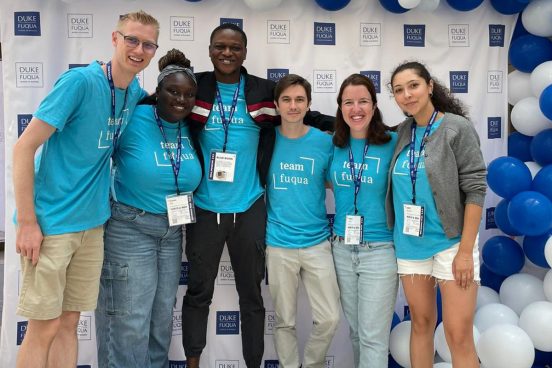Duke Daytime MBA Student Blog

Event Builds Management Skills
As a member of Fuqua’s Finance Club, I helped to host the First Annual Global Finance Case Competition. It was a way to bring together competitors from like-minded business schools to sharpen their skills in front of a panel of investment bankers, with a handsome prize hanging in the balance. What resulted was a spirited event, and we hope, the beginning of a Fuqua tradition.
This event was on Friday, November 11, and it was not without its hurdles. I was intricately involved in its development, and as this was a first time event, there was no template to use. After all, we wanted this to evolve into a signature event for Fuqua; no way we could get there if we borrowed ideas from other schools. It turns out this is a pretty complicated process. The learning curve was steep, and included a few errors along the way. In the end, though, everything worked out for the best: the participants all made tremendous impressions on the investment bankers who were serving as judges, and everyone seemed to be riveted by the case (prepared by Fuqua faculty).
In organizing this, I may have gotten something different out of the case competition than our participants did. I won’t pretend that I had to work harder, or that I had more late nights than those who actually had to dissect the case, but it was a learning experience of a different order. Here are a few lessons I took away from my first stab at organizing a large event, lessons that will be helpful in business (and hopefully beyond):
- Persistence Works: It turns out that bankers (who we were seeking as judges) and MBA students (who we saw as the participants) are actually pretty busy people. It was difficult enough to figure out who to contact, let alone how to contact them. Fortunately, we had a team dedicated to this task, which may have been impossible otherwise. Ultimately, enough people came around to make this a great event, but not as soon or as effortlessly as we had thought.
- Build in Time for Fire Drills: We thought that we had meticulously planned the events of the competition, such that all contingencies were accounted for; I should have known better. This harkens the concept of ‘unknown unknowns.’ We were well suited to handle issues that we were aware of, but there were more beyond those that were unanticipated that threatened the competition. Due to the diligent work of our team, none of these hurdles became a serious problem, but it’s certainly something we’d need to make a provision for in the future.
- Don’t go it alone: Though we wanted to start from scratch, as far as style was concerned, there were logistical points we wouldn’t have mastered by ourselves. A brief discussion with the Health Care Club, which was hosting a similar event, helped defuse some of the problems, before they became problems.
- Always Say Thank You: For all of us working on this project, it was difficult to visualize it. There was no past reference point that we could compare it to; it was almost abstract. I think the feeling that we were all working together, and that everyone’s efforts were valued, was imperative to keeping the team focused.



